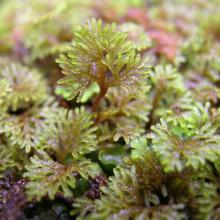
Announcing a new project funded by the Global Biological Information Facility (GBIF).
We are excited to announce the launch of a project entitled Early Land Plants Today: Uniting Liverwort Taxonomy, Nomenclature, & Geography.
Project Summary: Liverworts (Marchantiophyta) are pivotal in our understanding of early land plant evolution. They form a conspicuous and important component in many terrestrial ecosystems throughout the world. The objective is to unify the vastly scattered biological literature on liverwort taxonomy, nomenclature, and geography. We have already developed a preliminary dataset, derived from over 3000 publications and contributions from the bryological community. This represents the most comprehensive catalogue of liverworts worldwide, including systematic and taxonomic information for approximately 30,000 names and synonyms representing over 9000 taxa, coupled with over 360,000 distribution records derived from almost 450 geo-political units. The unification of nomenclatural, taxonomic, and geographical data has many implications and useful applications, including the study of species richness, patterns of diversity, and conservation. GBIF funding will allow the first phase to be completed and data to be migrated into the Field Museum's Collection Database (KE EMu). New data will be recorded and added as they are synthesized, and, combined with the extensive information already gathered, it will all be made public through the internet. Significantly, our databasing efforts will contribute data to other international databasing activities such as GBIF, Species 2000, MoST TROPICOS, NSF and other scientific programs, as well as the Encyclopedia of Life project.
Community Participation: In recognition that the documentation of synonymies and distribution ranges on a global scale is a massively challenging task, we actively seek and encourage contributions from the bryological community to improve the quality of the data and to reach a consensus on "accepted" taxa. The quality of the data lies strongly on collaboration between institutions and the bryological community in general. Through an earlier phase of the project we received contributions from over 20 colleagues throughout the world, providing valuable feedback and contributing towards synonymy and distributional data. We wish to continue to foster this endeavour, inviting and encouraging community participation. We have a variety of media to provide feedback and the provision of data, including pass-word protected web access to aspects of the data and a google group/message board.
If interested in contributing please contact: Matt von Konrat, Ph.D. Department of Botany, The Field Museum. 1400 South Lake Shore Drive, Chicago, IL 60605-2496, U.S.A. Email: mvonkonrat at fieldmuseum.org
Acknowledgements: The compilation and maintenance of the data is being directed by Anders Hagborg (The Field Museum, Chicago) and Lars Söderström (Department of Biology, NTNU, Norway). John Engel (The Field Museum, Chicago) is a leading consultant and contributing vast resources. However, acknowledgement of the broader community is warranted because it has been their contributions that have helped create this opportunity. Primary collaborators include: Robbert Gradstein (University of Göttingen, Göttingen, Germany); Rui-Liang Zhu (East China Normal University, Shanghai, China); Matt Renner (University of Sydney, New South Wales, Australia). Critical participants have included: Elizabeth Brown (University of Sydney, New South Wales, Australia); Barbara Crandall-Stotler and Raymond Stotler (Southern Illinois University, Illinois, U.S.A.), Gregorio Dauphin (Missouri Botanical Gardens, Missouri, U.S.A.), David Glenny (Landcare Research, New Zealand), Jochen Heinrichs (University of Göttingen, Germany), Aino Juslén (University of Helsinki, Finland), Robert Magill (Missouri Botanical Gardens, Missouri, U.S.A.), David Meagher (University of Melbourne), Sinikka Piippo (University of Helsinki, Finland), Tamás Pócs (Eszterházy College, Hungary), Elena Reiner-Drehwald (University of Göttingen, Germany), Li Zhang (The University of Hong Kong), and Dulip Daniels (Scott Christian College, India).

